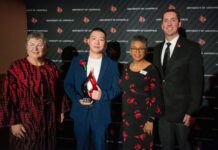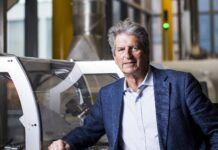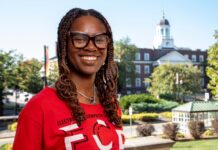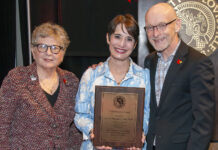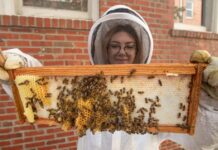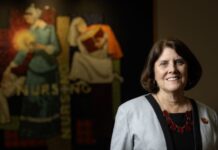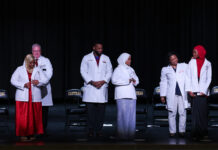
Jason Chesney, MD, PhD, will take the reins as director of the University of Louisville’s James Graham Brown Cancer Center, pending approval by the UofL Board of Trustees. In making the announcement, Gregory C. Postel, MD, interim president of the university, noted that Chesney will begin serving as acting director until the board takes formal action on the appointment.
Postel anticipates the board voting on the appointment at its May 18 regularly scheduled meeting.
Chesney succeeds Donald Miller, MD, PhD, who has served as the director of the center since 1999 and is returning to the faculty.
“We had an outstanding pool of candidates from throughout the nation,” Postel said. “The committee determined, and I completely agree, that Jason is the right person at the right time for the James Graham Brown Cancer Center. Jason’s full understanding of how interwoven research is to the delivery of innovative patient care will help us remain leaders in pioneering new and better treatments for people who suffer from cancer.
“I cannot thank enough the members of the search committee, which was led by Dr. Kelly McMasters, chair of the Department of Surgery. This group of people was tasked with sifting through a number of very high-quality candidates and finding the right person for UofL.”
In addition to serving as the director of the cancer center, Chesney also will be an associate vice president for health affairs. He also will continue to hold the Brinkley Endowed Chair in Lung Cancer Research.
“At the James Graham Brown Cancer Center, we have the chance to have a major impact on the welfare of our region’s population through an expansion in our clinical enterprise, outreach program, basic and clinical research and education programs,” Chesney said. “I am humbled that I will have the opportunity to see to it that we take advantage of it.
“The foundation of excellence that has been established by Dr. Miller during his tenure is extraordinary. It truly is an honor to be asked to lead the next phase of development.”
Chesney earned his bachelor’s degree in anthropology followed by his PhD and MD, all from the University of Minnesota. He performed his residency at Memorial Sloan Kettering Cancer Center and Cornell University Medical College-New York Hospital. He was a clinical fellow in the division of immunology at Weill Medical College, Cornell University.
He joined the University of Louisville in 2003 as an assistant professor, earning the rank of associate professor with tenure in 2008 and full professor in 2014. He holds joint appointments with the departments of Biochemistry and Molecular Biology, and Pharmacology and Toxicology.
Administratively, he served as associate director for translational research at the JGBCC, as well as director of the center’s cancer trials program and the biorepository, and director of the joint JGBCC and Clinical Translational Research Biorepository, Catholic Health Initiatives Institute for Research and Innovation. He was named the Brinkley Endowed Chair in Lung Cancer Research in 2015.
Chesney is an inventor on nine U.S. patents for new cancer therapies and his laboratory research has resulted in two ongoing Phase I clinical trials of novel cancer drugs that are currently available to advanced cancer patients. In 2014, Chesney’s clinical research team and a second team from Memorial Sloan Kettering Cancer Center were the top two clinical groups worldwide to find that the combination of ipilimumab with another immune checkpoint inhibitor, nivolumab, was the most effective immunotherapy regimen ever developed for cancer patients.
Throughout the past 10 years, Chesney’s research group has discovered the roles of several metabolic enzymes in the development and progression of lung cancer, including 6-phosphofructo-2-kinase 3, choline kinase and cytochrome c oxidase. These new metabolic targets are being interrogated for their utility in the development of new drugs to treat not only lung cancer but also other types of cancer. Chesney also has been at the forefront of understanding the metabolic effects of cancer-driving genes including Ras, the estrogen receptor and the epidermal growth factor receptor.
An internationally requested speaker, Chesney has made research presentations in countries including China and Belguim, as well as throughout the United States. He has authored more than 75 scientific papers appearing in leading journals such as the Proceedings of the National Academy of Sciences, Nature Communications and the Journal of Biological Chemistry.
Chesney is a member of the American Association for Cancer Research, the American Society of Clinical Oncology and a standing member of the National Cancer Institute’s Tumor Cell Biology Study Section. Additionally, he has either chaired or served as a reviewer on a multitude of study sections both within the National Cancer Institute and other national research organizations. He also serves as a reviewer for peer-reviewed journals including Nature Medicine, Cancer Cell, Journal of Clinical Investigation and PLOS One.




